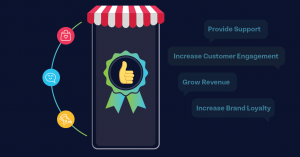
AI technology today
Few things have the transformative potential of artificial intelligence (AI). It has the power to completely change how we live, work and get around. If electricity and the internet changed humanity forever in the 20th century, then AI will in the 21st. It’s predicted that AI will bring a massive shift in how people perceive and interact with technology, with machines performing a greater and greater number of tasks and, in many cases, doing a better job of it than humans.
By its simplest definition, AI is an umbrella term for technologies that are inspired by biological systems that give computers human-like abilities related to seeing, reasoning, hearing, and learning. Today, artificial intelligence technology encompasses things like machine learning, natural language processing (NLP), machine reasoning, deep learning, and computer vision. It’s wise to think of this definition as fluid. What is considered AI today, once adopted, will be commonplace, no longer considered AI. So let’s have a look at the AI trends to watch.
People will start taking more notice
Vince Conitzer, professor of computer science at Duke University, suggests that the interest from the general population in the social impacts of AI will continue to rapidly grow. “Many general themes have been thrashed out in the conversation – technological unemployment, autonomous weapons, machine learning systems based on biased data or linked to suppressing dissent, AI systems making moral judgments – but developments and failures will further drive and inform this conversation.”
Conitzer sees interest in AI reaching groups outside of the industry. Lawyers will start to grapple with how laws should deal with autonomous vehicles; economists will study AI-driven technological unemployment; sociologists will study the impact of AI-human relationships. This is the world of the future.
Artificial intelligence technology will further be democratized
The results of a recent study on what business and technology professionals spend their days on revealed that 58 percent of them are researching artificial intelligence technology, while only 12 percent are actually using an AI system. This is partly because of adoption rates, but also because AI right now is tricky. It requires very specialized skills or infrastructure to implement. Companies like Facebook have realized this and are already doing all they can to simplify the implementation of AI and make it more accessible. Cloud platforms like Google APIs and Microsoft Azure are allowing developers to create intelligent apps without having to set up or maintain any other infrastructure.
Niche AI will grow
By all accounts, 2017 was not the year for large, general-purpose AI systems. Instead, there we started seeing an explosion of specific, highly niche artificial intelligence technology systems. These included autonomous vehicles (cars and drones), robotics, bots (consumer-orientated such as Amazon Echo and personal assistants), and industry-specific AI (think finance, health, security etc.).
Progress will continue to be made across AI development
It was way back in 1967 that the prediction was made by an American-based tech laboratory: “Within a generation, the problem of creating artificial intelligence will be all but solved.”. While it’s too soon to call the prediction prescient, progress is being made. Here are a few examples:
Ongoing research into AI’s basic building blocks, including natural language understanding, vision, speech, reinforcement learning, and system optimizations for AI workloads.
Systems with improved attention and memory are now able to tackle more than one problem or more complex problems (such as reasoning or inference).
Algorithms now require less, data and can fill in the blanks using machine learning.
The development of systems that are inspired by core aspects of human intelligence. A machine, for example, with intuitive psychology capable of ‘thinking’ about issues of causality.
Continued conversation around ethics, security, and privacy
Most AI systems are immensely complex sponges that absorb data and process it at tremendous rates. The risks related to AI ethics, security and privacy are real and need to be addressed through consideration and consensus. Sure, it’s unlikely that these problems will be solved immediately, but as long as the conversation around these topics continues, we can expect at least some headway.
While this list is by no means exhaustive, it does provide us with good insights into the direction that AI is heading. If you’re interested in how these artificial intelligence technology trends might affect marketing moving forward, then read our latest article addressing how AI can help improve your marketing operations.
Explore other articles
Step into the future of business messaging.
SMS and two-way channels, automation, call center integration, payments - do it all with Clickatell's Chat Commerce platform.








